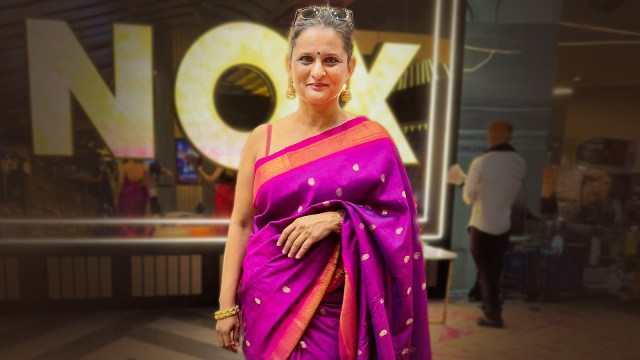📣 For more lifestyle news, click here to join our WhatsApp Channel and also follow us on Instagram
Geetanjali Kulkarni on facing a career slump and prioritising mental health: ‘Of course, I go to therapists’
"My family has been a great support, too. I work on myself, and try to manage my emotions. I also do meditation, I believe in Vipassana, a Buddhist way of meditating," the Gullak actor added
 My theatre background has shaped me as a person and strengthened me to handle the challenges that come with this profession, said Geetanjali Kulkarni. (Photo: PR handout)
My theatre background has shaped me as a person and strengthened me to handle the challenges that come with this profession, said Geetanjali Kulkarni. (Photo: PR handout)Geetanjali Kulkarni struck a chord with audiences as Shanti Mishra from the series Gullak. Playing the character taught her something unexpected—especially about the lives of homemakers, a role she had previously undervalued as a working woman. Today, she dedicates her character to all the women who sacrifice their dreams for their families.
In a candid interview with indianexpress.com, Geetanjali Kulkarni – who likes to call herself a theatre person – talks about her career trajectory, not getting good work for nearly three years despite doing an “important film,” the importance of taking care of mental health, working on stage versus the screen, and her equation with husband and actor Atul Kulkarni, despite being “very different” individuals. Edited excerpts below:
Q. From theatre to films and now OTT, how has your journey been?
Geetanjali Kulkarni: It’s been a journey of ups and downs, but an interesting one. My theatre background has shaped me and strengthened me to handle the challenges that come with this profession. I’m also glad I get to share my experiences with young audiences through platforms like Spoken Fest. When you engage with an artist’s journey, you truly understand the struggles they’ve been through.
Q. Gullak brought you mainstream recognition. What about the show resonated so profoundly with audiences?
Geetanjali Kulkarni: I think Gullak struck a chord because it’s a slice-of-life story. It shows the everyday realities of middle-class families in India. Plus, it’s a wholesome family watch, unlike many shows today. Plus, it has humor, and despite being nostalgic, it speaks in today’s language. The feel is very Indian, which is very important.
Q. How similar or different are you to Shanti Mishra in real life?
Geetanjali Kulkarni: Shanti Mishra represents middle-class women not just in India but worldwide. While our circumstances may differ, our emotions are similar.
One key difference is that I’m a working professional, whereas Shanti is a homemaker. I don’t have children, she does. But the way she expresses love, concern, and frustration—those emotions are familiar to me, to my mother, and to so many women from middle-class families across the world, especially when it comes to their families.
However, I must admit I always felt that being a homemaker is not a good thing to be. But when I played Shanti, I could empathise with homemakers and realised that it’s such an important thing, women who give their life to feed their family members, to take care of them. So, Shanti is my tribute to all homemakers and women who have sacrificed their careers and everything else for their families.
Q. You and Atul Kulkarni have been married for 30 years. How do you balance personal and professional life?
Geetanjali Kulkarni: Atul is more of a friend, and we’ve been together for 30 years now. We could make this journey together since we are artists and can exchange ideas. Otherwise, as individuals, we are very different. We critique each other’s work, exchange ideas, and support each other. That has kept us going.
Q. Tell us about your session at the Spoken Fest. Why did you agree to be a part of it?
Geetanjali Kulkarni: I had heard a lot about Spoken Fest but missed it multiple times. This time, when I was approached, I immediately said yes. As a theatre actor, I’ve always performed lines written by others. But Spoken Fest gave me the chance to write something of my own and push myself to execute it. I love sharing personal anecdotes, especially in a humorous way, and this was the perfect platform. I’m a bit of a clown that way. Hope the audience enjoyed it.
Q. How challenging or easy are the three mediums (theatre, films, OTT) from each other? Which one do you enjoy the most?
Geetanjali Kulkarni: Each medium has its charm. Theatre is my first love—it comes naturally to me. I enjoy live performances but it requires intense preparation. You have to be efficient, alert and aware. And you have to have a craft. You are solely responsible for carrying the show forward.
I’ve also started enjoying the screen, which I have been doing for about 12 years. It has its beauty, and you can really soak yourself into that work. You don’t need to think about the fourth wall or the audience.
Having said that, there are challenges. You have to fit into a role. In theatre, I played an elephant in Gajab Kahani, but that’s not possible in films because they are more realistic. So, you are more likely to get trapped and get the same kind of roles. Plus, theatre does not pay but films do; not always, but there is a commercial angle. That is a good thing about the screen.
 My career has had its share of struggles, especially in the beginning, said Geetanjali Kulkarni. (Photo: PR handout)
My career has had its share of struggles, especially in the beginning, said Geetanjali Kulkarni. (Photo: PR handout)
Q. Does a theatre background give actors an edge?
Geetanjali Kulkarni: Theatre training definitely helps refine your craft, but it’s not the only way to become a great actor. Some fantastic film actors have never done theatre. That being said, for me, theatre laid the foundation for my screen career. I don’t think I would have become a film actor without it.
Q. What’s the most extreme thing you’ve done for a role?
Geetanjali Kulkarni: Many things. When I was in my third year in drama school, Valentin Teplyakov, a theatre director from Moscow, visited. I was playing a character called Sara, a tuberculosis patient from Anton Chekhov’s Ivanov. I did not eat for nearly 15-20 days because I had to feel the pain and weakness of a tuberculosis patient. As an actor, you have to do such stupid things. Well, not stupid, but you have to do them to have an idea and create an experience for yourself. I think that was the most grueling thing because I was very young at that time, a novice, and I was trying to experience method acting. It helped me play that role; but I was really not aware of what I was doing.
Q. How do you cope with career lows—failed or delayed projects, lukewarm audience response, or no work for months?
Geetanjali Kulkarni: My career has had its share of struggles, especially in the beginning. I faced many stumbling blocks when I started my career after graduating from the National School of Drama in 1996. It taught me a lot –– to keep my calm, to keep myself occupied with workshops or reading, to not waste time when there are no projects, and instead, to utilise the time to learn something useful. But I also spent much time not doing anything; that helps you, too. It is essential to be physically and mentally fit for an actor. I also sing a bit, which has helped me. My riyaz makes me feel good. And I have a lot of friends with whom I talk often.
Getting or looking for work is much easier when you work hard than when the audience does not accept it or doesn’t do well. But these things happen; it’s a part of life. It’s essential to have such phases so that we put in a lot of effort and choose the work we want to do.
View this post on Instagram
Q. Has work ever taken a toll on your mental health? How do you ensure to prioritise it?
Geetanjali Kulkarni: Yes, it has, especially after Court, which I thought was a very important film with me in a pivotal role. Despite that, I didn’t really get good work for some three years. I had high expectations, but I felt very low when opportunities didn’t come.
I believe in seeking help, so, of course I go to therapists — they’ve helped me a lot. My family has been a great support, too. I work on myself, and try to manage my emotions. I also do meditation, I believe in Vipassana, a Buddhist way of meditating. And I have my music. I also work for children in a village, which makes me much more aware of who I am and what I want to do.
Q. What is your most significant learning as an actor?
Geetanjali Kulkarni: Acting is not just my profession; it has made me a better, more aware, more inclusive human being. It has opened so many paths for me. Thanks to my profession, I meet many people who have opened new chapters in my life. I feel better than I was 30 years ago, and that is very important for me.
📣 For more lifestyle news, click here to join our WhatsApp Channel and also follow us on Instagram
- 01
- 02
- 03
- 04
- 05




























